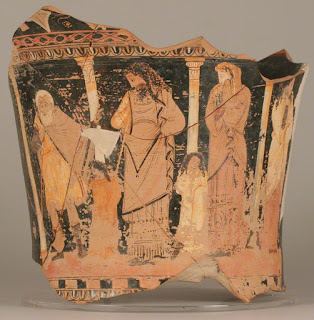"I'm actually the problem?" - Oedipus the King Revisited
 |
| Oedipus mask |
Remember the skin-crawling story of the king who unknowingly murdered his father and married his mother? Yes, the story of Oedipus, the famous namesake of Freud's psychological theory. Many believe that Sophocles, a Greek playwright of the fifth century BC, invented the story, but he merely adapted it. Even in his time, the story was considered old. It was believed by some to be true, but the story's origins were obscure — it was basically the ancient equivalent of a creepy urban legend that had been retold from one generation to the next. Sophocles, who was, in a sense, the Shakespeare or Spielberg of his time, had the clever sense to adapt it into a hit play.
Yes, the icky details of the story (which Freud focused on in his theory) make it memorable and many assume that is why the play is a classic, but it's more complicated than that. Sophocles' adaptation of the story endures, but others don't. Why? The crux of the story's profound truth actually rests on the irony, which Sophocles chose to emphasize, while other writers failed to recognize it.
In case you aren't familiar with the tale: The city-state of Thebes is suffering from a dreadful plague due to sin — the murderer of King Laius (Oedipus' father) has never been caught and brought to justice. The people turn to their king Oedipus for a cure. Oedipus curses the murderer and confidently states he will find him and save the city from its sickness. Oedipus essentially proclaims himself to be the savior of the city-state and its people, only to discover, by the end of the play, that he is the cause of its downfall and disease. At discovering the truth, he blinds himself by stabbing his own eyes.
When Oedipus could physically see, he was actually blind. Oedipus thought for sure that he was going to fix the problem, but it turns out, he is the cause of the problem. Does this irony strike a nerve? Of course. We live this out on a less tragic scale all the time. How often do we encounter situations and in our arrogance think, "I'm going to fix the problem and make it better," only to discover later that, "I'm actually making the problem worse and I would have been better off just minding my own business and keeping my big, stupid mouth shut!" Or even more embarrassing, that we have actually caused the problem to begin with. And how often do we also dive head-first into dysfunctional relationships with the conceited belief, "I am going to fix this person," only to discover later that the "help" is actually hurting the person and that we're no better off than the screwed-up person. And we're also guilty of this self-deception on a bigger scale (think politician) and also on a cultural level. It is interesting to note that Sophocles, in addition to being a playwright, served in public offices, military and civil. He lived to ninety years of age and in his long life, witnessed the rise and fall of Athens. Ancient Greece, Athens in particular, prided itself on its intellectual, social, and medical achievements and was known for its relentless self-will, but by the end of Sophocles' life, its conceit had been worn down considerably. Its glittering achievements barely concealed an increasing inner decay and chaos (sound familiar?) and of course, eventually Greece, along with its contemporary, the Roman Empire, was literally brought to ruins.
But the main point being made here — aren't we, as individuals, truly the source of all of our problems? The London Times, in 1910, asked Christian writer G. K. Chesterton to write an editorial piece answering the question, "What is wrong with the world today?" G. K. Chesterton wrote, "I am." In a culture in which the norm is to point the finger at the opposing political party (or try to come up with yet another political party if that doesn't work), gee, consider the possibility that I'm the problem? What a novelty.
And the story of Oedipus the King continues to endure...
(Julian Moody, in his pioneering work in business, often found that presidents, executives, and managers seeking a solution for a problem often turned out to be the source of the problem. See topic: "Change (Real Change) Begins With Individuals" in our project Dialogues with Julian Moody: On Life, Business, Sustainability, and Other Things.)
(Posted 3/9/2012)
